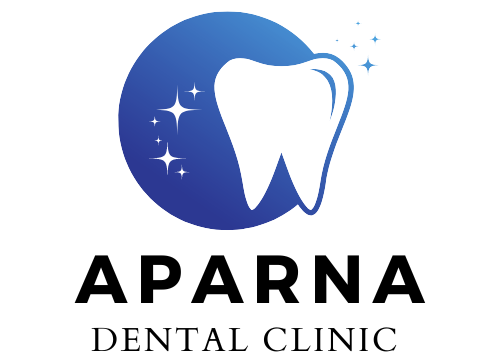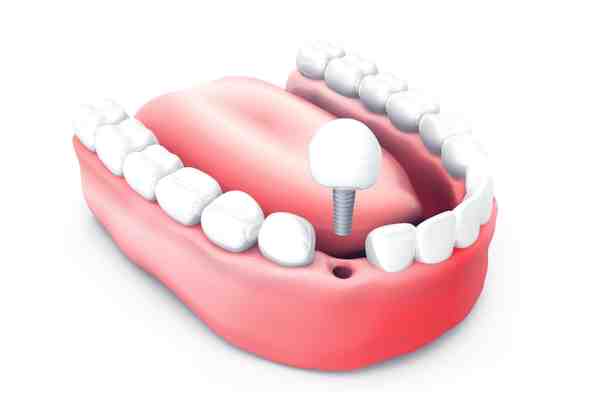
Get Your Smile Back: Dental Implants for Missing Teeth
Are you missing teeth? Are you looking for a way to restore your smile and regain your confidence? If so, dental implants may be the perfect solution for you. A dental implant is an artificial tooth root that is surgically implanted into the jawbone to replace missing teeth.
Dental implant surgery is a safe and effective way to get your smile back and restore the function of your missing teeth. They provide a secure and reliable way to chew and speak properly. Read on to learn more about dental implants and how they can help you get your smile back.
Does a missing tooth need to be replaced?

You may lose your teeth for various reasons like dental cavities, root infection, teeth extraction, injury, and cancer surgery.
Missing teeth can cause issues like improper chewing on the missing tooth side. Therefore, you tend to chew on the opposite side.
Chewing, on the other side, leads to more cavities on that side and which, if neglected, can cause another missing tooth. If a dental implant fills the empty space, that will evenly distribute biting and chewing force across all teeth. So you won’t get pain while eating. Your speech also improves a lot.
Improper chewing techniques due to missing teeth lead to Unequal jaw movements. This will eventually put pressure on both the temporomandibular joins. Then you will experience jaw pain, difficulty in mouth opening, and clicking sound.
A missing tooth creates a gap. This causes neighboring teeth to shift in an attempt to fill the void. Misalignment or crookedness will result from the movement of the remaining normal teeth. It also causes damage to the jaw bone.
The dental root no longer exists. The body ceases to send nutrients to the jawbone. This results in a lack of stimulation. The bone support for the remaining teeth is weakened as a result—the patient’s chances of developing dental disease rise.
They also improve chewing efficiency, Prevent speech problems.
So it would be best if you replaced your missing teeth with either.
- Dental implant
- Bridges
- Dentures
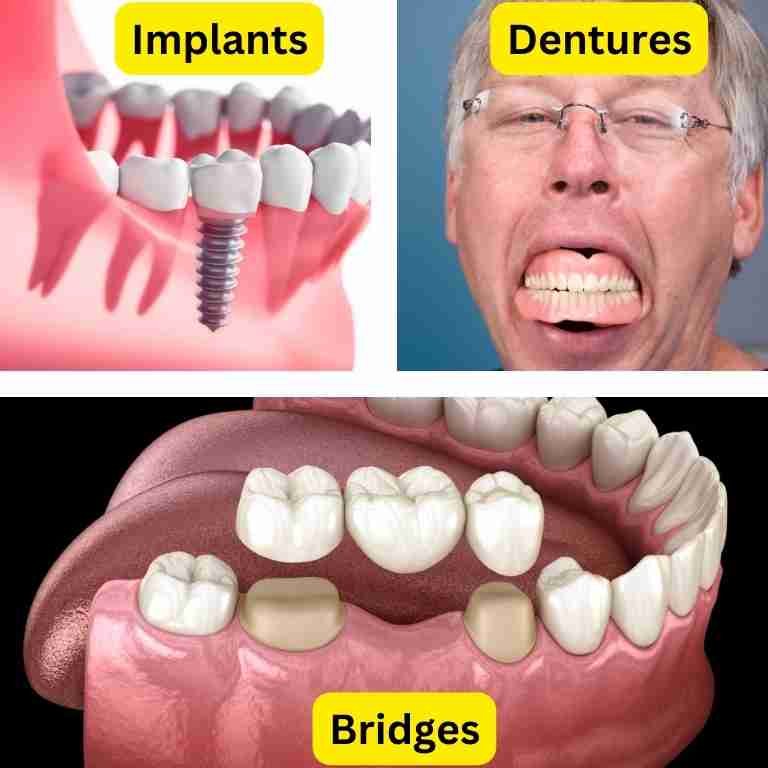
What are dental implants?
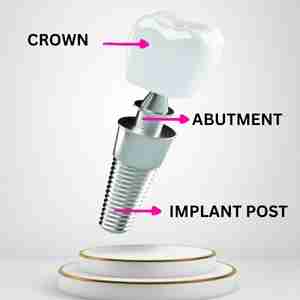
Dental implants may be the answer you’ve been looking for if you live with missing teeth. Dental implants are permanent replacements for missing teeth that look and feel like natural teeth. They provide a secure and reliable way to restore your smile, confidence, and ability to chew and speak properly. Implants are constructed from biocompatible materials, such as titanium, and are designed to fuse with the jawbone. With proper care and maintenance, dental implants can last a lifetime!
The implant contains mainly three parts.
Metal post [titanium material]- Base of the dental implant that gets embedded in the jawbone like a natural tooth root. It provides a necessary anchor to the crown.
Abutment– a metal connector that connects the metal post and the crown
The crown is the topmost portion of the dental implant, resembling the natural teeth in color and form. It is available in many types like metal ceramic, all-ceramic, zirconia, and composite.
Where to undergo braces treatment in Hyderabad?
Hyderabad dental clinic & implant centre is a comprehensive and fully integrated Best Dental Hospital in Hyderabad with experienced dentists who offers the best dental implant treatment at affordable price
What happens if you delay replacing your missing teeth?
The teeth next to the missing tooth will gradually move closer to one another to close the gap. If this happens, it will be difficult for the dentist to replace the lost space later.
So it’s very important to replace the lost teeth immediately without any delay.
Reasons for dental implants
Missing teeth can significantly impact your life, from difficulty with chewing and speaking to decreased confidence in your appearance. Dental implants offer a long-term solution for replacing missing teeth that don’t require dentures or other costly treatments. Dental implants provide a secure and natural-looking replacement for missing teeth.
Implants are designed to be permanent and provide a stable base for dental crowns, bridges, or dentures. This can help prevent the shifting of surrounding teeth, which may occur when missing teeth are not replaced. Implants also help prevent bone loss in the jawbone that may occur with missing teeth.
Implants are constructed from biocompatible materials, such as titanium, and are designed to fuse with the jawbone. This helps create a stronger, more reliable replacement for missing teeth. Furthermore, implant-supported restorations typically last longer than traditional dental bridges or dentures. This makes them a more cost-effective option for those looking to replace missing teeth.
Dental implants are an ideal solution for many people to replace missing teeth and restore their smiles. They offer a natural-looking replacement that can last a lifetime with proper care and maintenance.
The dental implant process

When it comes to replacing missing teeth, dental implants are one of the most popular options. The process of having a dental implant placed is complex, but with the help of your dentist, it can be a relatively straightforward procedure.
The first step in the dental implant process is to consult your dentist and determine if dental implants are the right choice. Your dentist will examine your mouth and take x-rays to assess the health of your jawbone and other teeth before making a recommendation.
Once it is determined that dental implants are the right solution for you, your dentist will surgically place the titanium implant posts into your jawbone. These posts act as anchors for the artificial crowns or bridges that will eventually be placed on top. After the implant posts have been placed, they must heal, and bond with the bone in your jaw before the next step of the process can occur.
Once the implants have healed, your dentist will place abutments, which are small metal connectors, onto the tops of each post. This creates a platform for the artificial crowns or bridges to attach to. Your dentist will take impressions of your mouth to create custom-fit crowns or bridges that match the shape and color of your natural teeth. Once ready, these crowns or bridges will be attached securely to the abutments.
The entire process, from start to finish, may take several months, depending on the number of implants being placed and your healing process.
Are dental implants right for me?
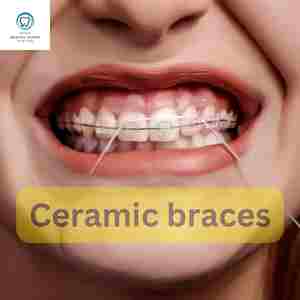
When considering whether dental implants are right for you, it’s important to know that there are certain factors that can determine your eligibility. Generally speaking, you need to be in good overall health, have healthy gums, and have sufficient jawbone density to be a good candidate for dental implants.
Your dentist will thoroughly evaluate your mouth to determine if dental implants are the best solution for your situation. This assessment may include a panoramic X-ray to evaluate the health of your teeth and jawbone and a CT scan to get detailed images of your jaws. The most important step for implant placement was a 3-dimensional analysis of bone using the CBCT [cone beam computed tomography] system. Based on this analysis, the type of implant, implant dimensions, and the number of implants can be evaluated.
Your dentist will also consider any underlying medical conditions you may have which could affect the success of implant surgery, such as diabetes or gum disease. If you are a smoker, you should also be aware that smoking can negatively affect the success of implant surgery, and quitting may be recommended before proceeding with treatment.
It is also important to consider the cost associated with dental implants, as this procedure is generally not covered by insurance. However, suppose you are considering implants to replace your missing teeth. In that case, the benefits of improved oral health and a beautiful, confident smile may be worth the financial investment.
Ultimately, you should discuss all of your options with your dentist so that you can make an informed decision about the best course of action for restoring your smile. With the help of your dentist, you can decide if dental implants are the right choice for you.
The benefits of dental implants
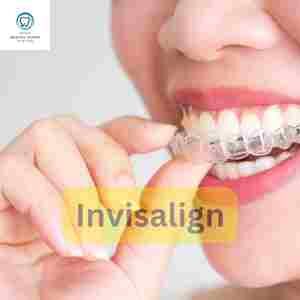
Dental implants are a highly effective solution for missing teeth and come with many benefits.
First and foremost, dental implants provide a permanent solution to tooth loss, meaning you no longer have to worry about removable dentures or bridges. This also increases comfort since the implants are secure and stable compared to dentures or bridges.
Implants also look and feel natural, allowing for a more attractive smile and restoring your confidence. Dental implants can also secure bridges and dentures, providing additional stability and reducing the likelihood of embarrassing slipping.
In addition, dental implants help to preserve your jawbone, as they act as a replacement root to support your natural teeth. This helps prevent further bone loss, often when a tooth is lost. By protecting the jawbone, dental implants also ensure that your facial features remain intact and your smile remains healthy and beautiful.
Finally, dental implants can last a lifetime with proper care and maintenance, making them an investment in your long-term oral health. Unlike other restorative options, such as dentures and bridges, implants do not need to be replaced after a few years – they are made to last.
In summary, dental implants provide many benefits, including a permanent solution to tooth loss, natural aesthetics, improved stability and security, protection of the jawbone, and long-term investment in oral health.
However, dental implants are costly ( 3 times the cost of bridges and five times the cost of dentures). Therefore affordability is the main concern.
The complete or partial upper jaw will be removed as a treatment protocol for patients with mucormycosis. For such patients, implants are the only option for replacing missing teeth.
It also prevents bone loss which usually happens with dentures and bridges.
For elderly people with completely missing teeth, implants will be an excellent option.
Who is a good candidate for dental implants?
Implant placement was done only after the complete growth of the jaw was finished, that is, after adolescence.
Healthy individuals with good medical health, good bone density, and good width and height of jaw bones are ideal for implant placement.
Patients with controlled diabetes and hypertension can be managed
Medically compromised patients, osteoporosis, malignancies, and recent myocardial infarction patients are absolute contraindications for Implant placement
How much do dental implants cost, and does insurance cover the cost?
Implants are generally made up of titanium material; because they are expensive, they will cost you around 25,000-35000 INR per implant.
Some dental insurance plans may cover a portion of the cost of dental implants.
Dental implant procedure
The process of placing a dental implant is complex, but with the help of your dentist, it can be a relatively straightforward procedure.
Based on the function, an Implant can be of 2 types
- Immediately loaded implants
- Delayed loading of the implant
Delayed loading of the implant
The dental surgeon places the Metal post (implant base) in the jaw bone in the first sitting. Then he waits for 3-6 months for the surrounding bone tissue to heal. Once the tissue is properly healed, he keeps a crown (or cap) over the metal post. He waits for 3 to 6 months because the metal post implanted is not stable enough to support the crown immediately after placement.
This procedure should be done either immediately after tooth removal or afterone month of tooth removal.
Even though it needs multiple sittings, it has several advantages over Immediately loaded implants.
It carries less risk. Nerve damage and vessel damage risk are minimal.
It is relatively inexpensive.
In the first appointment: During the initial operation, a little portion of your gums is sliced to make room for the implant (the tooth socket the gum is covering). Your dentist will drill directly into the bone. This is done to insert the metal post, and a covering screw is placed on the metal post. The gum incision is stitched after implantation, giving it time to recover.
In the second appointment:
This is done three to six months after recovery from first surgery.
To disclose the implant, a new cut must be made. A cover screw is removed, and a healing cap [it will allow the surrounding tissues to heal] is then screwed on top of the metal post.
In the third appointment, the Abutment is now set to serve as the finishing crown’s supporting component. The Abutment is required to guarantee a secure fit for the crown that won’t be easily moved by forces exerted by human biting.
Immediately loaded implants.
With recent advances, implants can now be loaded immediately, i.e., the crown (or cap) can be placed in the same appointment or shortly afterward. At the same time, Delayed loading of the implant needs a 3–6 months healing period for the crown to place on the metal screw.
As a result, the number of appointments is reduced, and there is less trauma to the tissue. The other name for the Immediately loaded implant is .basal implant because they are implanted deep till the base of the jaw bone.
This procedure can be performed on patients who have a single missing tooth or multiple teeth or are completely edentulous.
Immediately loaded implants can be completed in 5-10 days.
At first appointment
First, the surgical site of the implant is entirely anesthetized. Specific drills drill the jawbone to screw the metal post. An abutment is then placed. And finally, suturing is done. Depending on the healing, you must must come after 1-2 days.
To simplify, The implants are drilled into the bone in just a few minutes using cutting-edge technology, and an abutment is placed on top of it..
In the second appointment.
Your dentist takes the impressions and sends them to a lab. Crowns are manufactured in the lab based on your dental pattern. Here no procedure is done except impressions are taken.
In the third appointment
After verifying that the crowns match you perfectly, They are fixed on the abutments using screws.
To verify wether the crowns are appropriate to you, you dentist check multiple parmaeters like teeth trial ,phonetateics[speech analysis] and tooth contact parameters.
In the fourth appointment
instructions like maintenance of the prosthesis and types of food to be taken immediately were explained, and the follow-up schedule was fixed.
